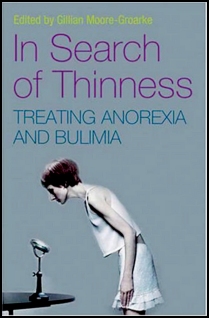Anorexia Nervosa
WHAT IS ANOREXIA NERVOSA?
 It is a potentially life-threatening disorder where one diets to the point of starvation. As the anorexia progresses, some may vomit, take laxatives or engage in excessive physical activity. The end result is significant reduction in weight of at least 25% of a person’s original weight, and in females a loss of the menstrual cycle.
It is a potentially life-threatening disorder where one diets to the point of starvation. As the anorexia progresses, some may vomit, take laxatives or engage in excessive physical activity. The end result is significant reduction in weight of at least 25% of a person’s original weight, and in females a loss of the menstrual cycle.
HOW CAN ANOREXIA AFFECT YOU PHYSICALLY?
Many females seek medical attention because of amenorrhoea (loss of menstruation), which often appears before noticeable weight loss has occurred. Other symptoms include anaemia, paleness, low blood pressure, swelling of the feet and ankles, reduced body temperature, and growth of down/fur on the back, arms, legs, and face. Dehydration and electrolyte disturbance, specifically potassium and chloride, can occur in vomiting patients. Heart failure and death can result if the condition is prolonged and severe.
HOW CAN ANOREXIA AFFECT YOU PSYCHOLOGICALLY?
A person with anorexia nervosa has an obsessive concern with their body size and a morbid fear of becoming fat. Generally they feel “If I am thin I will be happy and successful and everybody will like me”. Then the dieting begins, and as the weight loss is achieved, feelings of power and control set in. As dieting/weight loss continues, the body is no longer seen realistically. Now any fat whatsoever is undesirable, the whole world revolves around losing weight, food, nutrition, even cooking and preparing food are uppermost in the mind. Periods of anxiety and depression are common, not to mention feelings of self hate, self-worthlessness, and very low self-esteem. Social isolation and severe mood swings. Denial that there is a problem can lead to deceitfulness and manipulation. All this leads to further guilt and self-hatred. With anorexia, one can feel confused and very unhappy, yet the desire to lose weight is the strongest and uppermost in the mind. It is interesting to note that the vast majority of people develop the condition in their teenage years, and that it is sparked off at a time of stress. However, it can occur at any age. It is more common in females than males, yet the incidence is increasing in males.
HOW CAN ANOREXIA AFFECT YOU SOCIALLY?
Anorexia can control your whole life so much that a social life is non-existent. Food is your life. You have few friends, because nobody understands you. All you can think about is losing weight. You isolate yourself from friends and from family. You feel nobody likes you. Can you identify with what I am saying to you?
PATIENT’S PERSONAL EXPERIENCE
“For as long as I can remember, I was always very self-conscious, afraid of what people thought of me. I always felt stupid and ugly, and always wanted to have someone else’s face. I thought if I was thin, people would like me more, and would be closer to me. Then I started to cut down on my food. When my mother said I wasn’t eating and gave out to me I thought she was just being stupid and just wanted me to be fat like her. I knew about anorexia, but I didn’t think I had it, yet I kept cutting down on my food. My obsession was getting worse and worse. I seemed to be more afraid of food and what I ate. I kept cutting down all the time, and each time I lost weight I felt delighted even thought I knew deep down I was wrong I was getting more and more unhappy. I was scared of getting fat and losing control. I thought nobody cared. I felt rejected. And I thought no one liked me. I wanted everybody to like me. I tried to please everyone, yet I couldn’t eat…”
Finally I went for help. Slowly I am putting on weight, and I am dealing with my feelings. I realise that I am a person, and I am equal, and I count too. I am still afraid of food, and afraid I might become an overeater. But I am learning to love myself and have confidence in myself. I know I could not have done it if I did not seek help”.
TREATMENT
Left untreated, anorexia nervosa is unlikely to go away. Early diagnosis means early treatment and in turn means better prognosis. Please do not allow another day to pass. Look for help today. There are clinics and centres all over the country, which can help you. First you must identify you have a problem, then learn to accept it. Next seek help. The initial aim is to gain weight in order to avoid medical complications. At the same time psychotherapy is important to help identify and express one’s feelings and to help build up one’s self-esteem.
